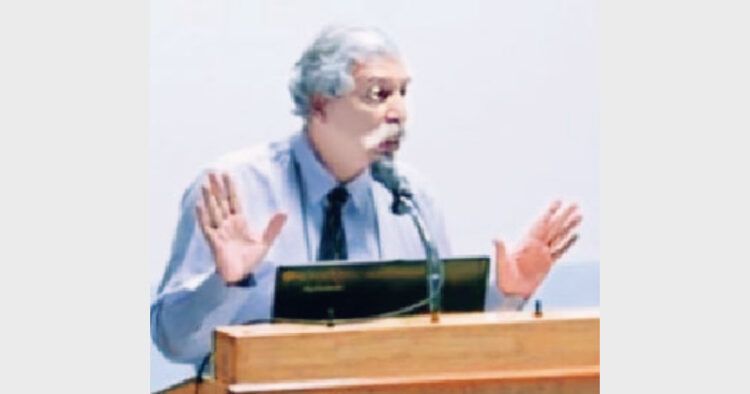Some usual voices tried to demonise Maj Gen GD Bakshi’s speech at IIT Madras as hate speech. Here is the report of actual proceeding by a student on the condition of anonymity
It was a busy evening at IIT Madras. Everyone was going back to one’s hostel after a busy day in the lab or in the classrooms. However, it was not another day for the IITians. We had Major Gen. (Dr) GD Bakshi with us, who was invited to talk on “The rise of Indian Army and the national security”. We completed our lab work and walked towards the CLT just 5 minutes before the lecture. A tall person with curled white moustache and shining face entered the room and was welcomed by a round of applause.
The talk by Dr Bakshi was informative and covering the war strategy being used during the great Maurya periods, Mughals and then by the British Indian Army. Moreover, he discussed the war strategies and advancement of the Indian Army during all the Indo-Pak wars. He expressed his views on how the Indian Army helped people in need. Some people from the ultra-left group got offended and expressed their disagreement. Their plan looked very organised and they seemed to have come prepared to disrupt the session by any means. The people felt bad about the liberation of Bangladesh from the cruel army of Pakistan.
Never mind, these are the same people who shed their crocodile tears for the human right violation but never care for lakhs of rape and murder of innocent Bengali people by their mighty Pakistani Army. We did not have any surprise from such people as these are the same people who admire terrorists like Yakub Menon and Burhan Bani. The people were offered a mike and requested to speak their heart out. The Kashmiri students interacted well with the Dr Bakshi and expressed their concern about the use of pellet guns and the current situation of the state. Out of sympathy, most of the audience expressed their concern about the prolonged curfew and
difficulty of the livelihood in Kashmir Valley. However, the people had nothing to say about the killing of Army personal by pulling their vehicle into Jhelum River and by lighting their bunkers with petrol bomb. Dr Bakshi responded to them in very polite manner and expressed his views on the use of pellet guns in the extreme cases for personal safety of the law
enforcing forces. He explained them that, ‘people of only 7 per cent geographical area of Jammu & Kashmir are demanding Azadi (Freedom) or merger with Pakistan while the rest 93 per cent want to remain with the union of India’.
He gave a detail of the rifles and other equipment snatched and burned by the mob. He mentioned how the policemen were pushed in the Jhelum River. Introducing himself as a native of Jammu he addressed them further about the proxy war used by Pakistan to create instability in the area. Creating a fake analogy between the recent Jat Andolan and the ongoing Kashmir issue, these people asked why pellet gun was not used during the Jat Andolan. Dr Bakshi explained the difference in the intentions of the mob in both the cases. In one case people protested but never confronted the law enforcing agency or never pelted stones while in the other case they intended for doing maximum damage to the agency. He also explained the royalty people get from Pakistani Inter Service Intelligence (ISI) for killing an army personnel based on the rank. The recent events of JNU, Jadavpur university and IIT Madras have eerie similarities. They are motivated for the similar
cause— ‘Breaking India’. They never lose their chances of humiliating the Indian Armed forces at any platform.
Many people from the audience expressed their sympathy for the few innocent people killed in the Kashmir incident and highlighted how the so called ultra-left liberal community of the IIT Madras was using these Kashmiri people in continuing their propaganda. It is worth noting that these communities who cry foul after an encounter of a terrorist never care for murder of an army personnel or a policeman. Finally, the discussion ended with the quote of Dr Bakshi which says, “It’s better to die for the Dharma rather than living with adharma”.













Comments